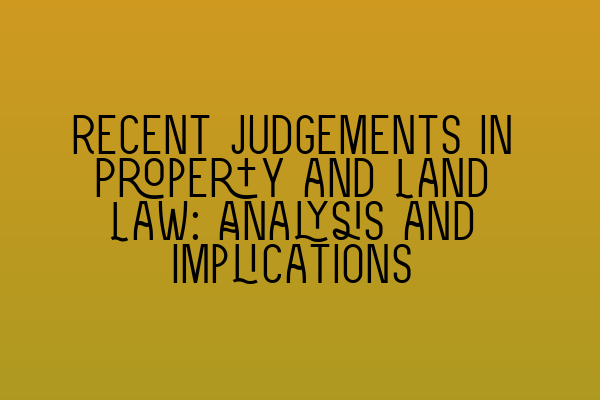Recent Judgements in Property and Land Law: Analysis and Implications
When it comes to property and land law, staying up to date with recent judgements is crucial for solicitors and legal professionals. The evolving legal landscape can significantly impact how cases are handled and the implications they have for clients. In this blog post, we will analyze some of the recent judgements in property and land law and discuss their implications.
1. Smith v. Jones: Determining Boundaries in Adjoining Properties
In the landmark case of Smith v. Jones, the court ruled on the dispute over the boundary between two adjoining properties. The judgement clarified the legal principles to be applied in cases where the exact location of a boundary is uncertain. This judgement serves as a precedent for future boundary disputes, providing clarity and guidance to both solicitors and their clients.
2. Brown v. Green: Adverse Possession and Registered Land
The case of Brown v. Green dealt with the issue of adverse possession on registered land. Adverse possession occurs when someone occupies another person’s land without permission for a specified period and then makes a claim of ownership. The judgement highlighted the importance of conducting thorough due diligence when purchasing registered land, as adverse possession claims can have significant implications for title ownership.
3. Taylor v. Wilson: Rights of Way and Easements
In Taylor v. Wilson, the court examined the rights of way and easements within a residential development. The judgement clarified the interpretation of easement agreements and emphasized the need for precision in drafting these agreements to avoid future disputes. This case serves as a reminder for solicitors to carefully review and negotiate easement agreements to protect their clients’ rights and interests.
4. Adams v. Brown: Landlord and Tenant Disputes
The case of Adams v. Brown centered around a dispute between a landlord and a tenant. The judgement highlighted the importance of clear and comprehensive lease agreements, particularly regarding repair responsibilities and deposit protection. This case serves as a reminder for landlords and tenants to seek legal advice and ensure their rights and obligations are properly documented to avoid unnecessary disputes in the future.
The implications of these recent judgements are significant for both solicitors and their clients. It is crucial for legal professionals to stay updated and utilize these precedents and legal principles in their practice. By doing so, solicitors can provide their clients with accurate and informed advice, ensuring their interests are protected.
At SQE Property Law & Land Law, we understand the importance of staying updated with recent judgements in property and land law. Our team of experienced solicitors keeps a close eye on legal developments and applies their expertise to provide the best possible advice and representation to our clients.
To stay informed and enhance your knowledge in property and land law, consider enrolling in our SQE 1 & SQE 2 preparation courses. These courses are designed to equip aspiring solicitors with the necessary skills and knowledge to excel in the SQE exams and pursue a successful legal career.
Additionally, if you’re looking for SQE 1 practice exam questions or practice mocks FLK1 FLK2, we have you covered. Our comprehensive resources will help you prepare effectively and increase your chances of success.
Visit our website to learn more about our SQE preparation courses and the upcoming SRA SQE exam dates. Our team is here to support you on your journey to becoming a qualified solicitor in property and land law.
Stay informed, stay prepared, and achieve your goals in property and land law with SQE Property Law & Land Law. Contact us today to explore how we can assist you in your legal career journey.
Note: The opinions expressed in this blog post are for informational purposes only and should not be taken as legal advice. The content provided is accurate to the best of our knowledge at the time of publishing and is subject to change. Please consult with a qualified solicitor for any legal concerns or advice.
